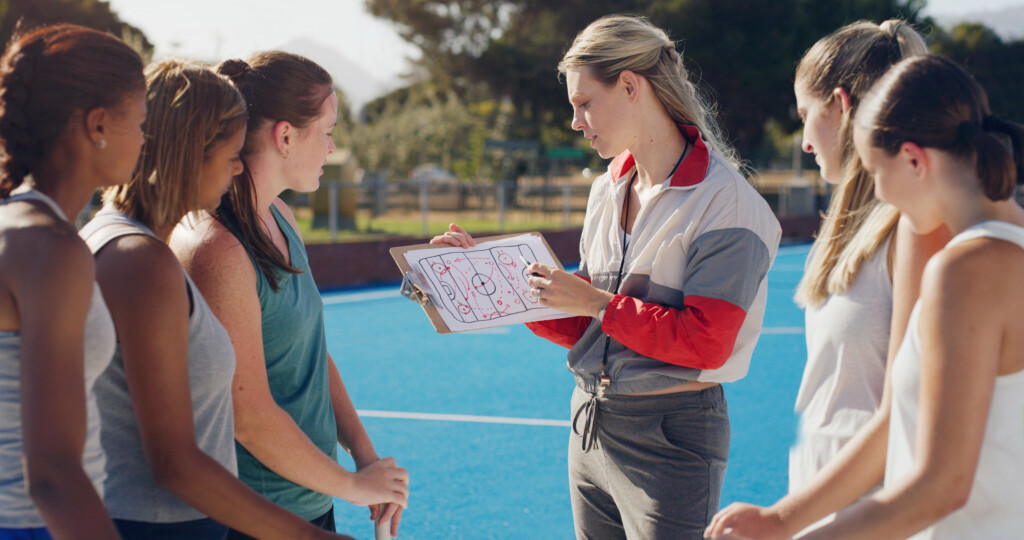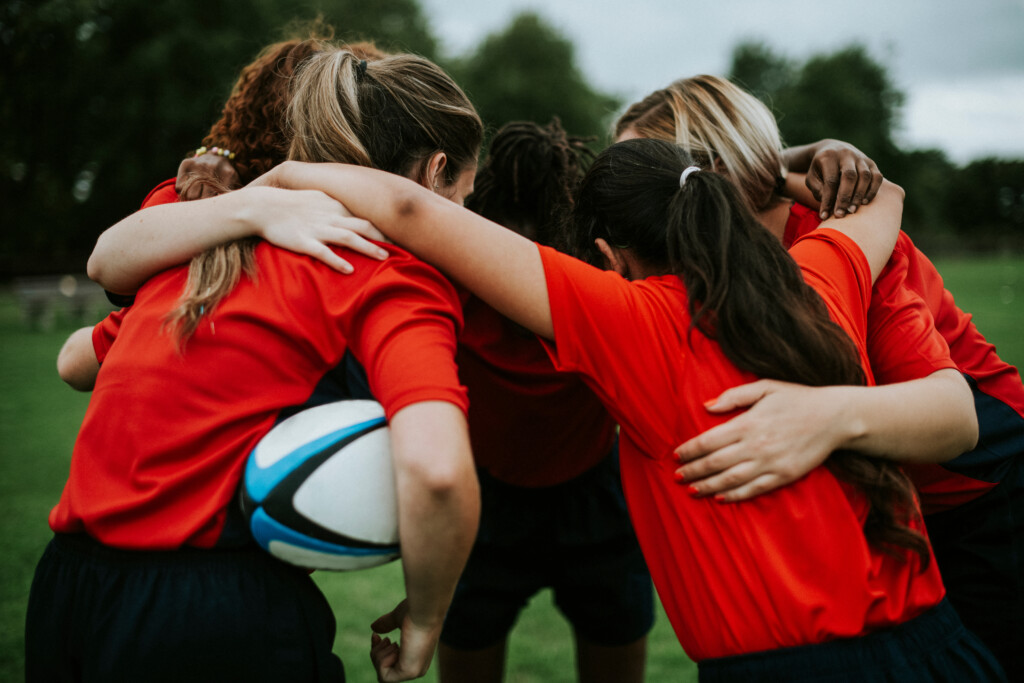Over the last 50 years, significant progress has been made in access and opportunities for girls and women to participate at all levels of sport in Canada. Despite this progress, the number of women in coaching remains alarmingly low (Banwell et al., 2019; Burton, 2019; Serpell et al., 2023). This is particularly true in the university sport system. For example, Canadian Women and Sport (2021) has reported that women hold head coaching roles for only 26% of women’s teams, 18% of mixed-gender teams, and 3% of men’s teams in Canadian collegiate and university sport.
While many Canadian universities have policies in place to address the gender gap, women remain underrepresented in coaching. Policy alone does not create change; people do. Unless there is engagement and commitment to support and sustain equitable sport environments, policies remain a guideline rather than a standard. Through the acknowledgment of the work that coaching involves, the practices that limit women from participating in coaching can be challenged and reimagined.
As a researcher who studies gender equity in Canadian university sport, I recently conducted a study on the underrepresentation of women coaches (see Finn, 2022). Alongside the current literature, this blog will explain why it’s important to address the underrepresentation of women in coaching at the university sport level. Further, it will focus on the need to explore the common, taken-for-granted practices, including the gender binary, work-life balance, and privilege, that may be sustaining gender discrepancies in university sport coaching. To conclude, practical recommendations for organizations looking to support women in coaching roles will be provided.
The gender gap in university sport coaching
It is crucial to work towards closing the gender gap in Canadian university sport coaching because if women’s leadership is missing from these organizations, so are important role models. Coaches remain visible leaders who impact the day-to-day experiences of their athletes. If women are continuously excluded from these positions, a lack of diversity in coaching and sports leadership becomes normalized (Wallick, 2018 When diversity is not prioritized in coaching positions, university athletic departments miss out on the benefits of varying perspectives and lived experiences, which may limit new insights, ideas, and skills (Finn, 2022).
There is a high degree of consistency in the sport leadership scholarship about barriers that women coaches face when seeking to achieve and maintain a coaching position, which can be vastly different than their male counterparts. For example, current literature has highlighted issues with hiring practices, as most selection committees are comprised only of men (Darvin & Lubke, 2021). Further, women still continue to experience covert and ambiguous displays of discrimination, even when they are successful at achieving a coaching position. For example, a recent study by Norman and Simpson (2023) found that women coaches experience gendered microaggressions within their positions, highlighting the subtle challenges that need to be navigated. Compounded by challenges to achieve work-life balance, lower salaries, and poorer job security, the lack of diversity in coaching and sports leadership remains (Burton, 2019; Finn, 2022).
Current supports for women in university sport coaching

In 2018, the Government of Canada announced its goal to achieve gender equity across all levels of sport by 2035. In efforts to work towards this goal, several programs and supports for women in coaching have been established at the university level. For example, the Coaching Association of Canada’s University Female Coach Mentorship Program, which has been in place from 2015-2021. Further, the Coaching association of Canada offers NCCP coaching education grants to support a more equitable sport coaching landscape.
Beyond mentorship programs and educational opportunities, sport organizations are working on actionable items that extend beyond coaching qualifications and experiences for women. To demonstrate, the University of Guelph has implemented the She’s Got Game initiative. The program includes a commitment to recruiting at least one-woman coach on every woman’s team. Further, the She’s Got Game initiative provides gender equity with pay of coaches, and equal opportunities for coaching development.
Existing programs and initiatives demonstrate that governments, sport organizations, and universities alike are aware of women’s underrepresentation in university sport coaching and taking steps to reverse the trend. However, more can be done. For instance, many of these programs and initiatives are focused on helping women to improve their coaching skills or offer mentorship opportunities. While mentorship and educational training are essential, we must also reflect on how these programs may perpetuate women’s marginalization in Canadian university sport coaching by not challenging the current culture (Finn, 2022). Additionally, these approaches focus on enhancing individual abilities, yet women are returning to coach within a system that remains unchallenged and unchanged (Demers et al., 2019). Therefore, rather than asking how women can fit within the male-dominated landscape of Canadian university sport, we need to ask how our assumptions about sport and how it functions impact or limit women in coaching. The following section will highlight this initiative, challenging the taken-for-granted nature of university sport. .
Taken-for-granted nature of university sport
The culture of Canadian university sport continues to be a critical limiting factor to women’s advancement in coaching roles. In other words, even if development opportunities are available to women and women are hired into coaching positions, coaching practices, and processes (such as demanding practice schedules) will continue to act as a limiting factor for women throughout their careers. The work of Norman, Rankin-Wright, and Allison (2018) has encouraged us to recognize the underrepresentation of women in coaching as “an outcome of a deeper issue, rather than the problem in itself” (p. 395). By doing so, we can engage with and challenge the current taken-for-granted nature of university sport to envision new ways to support women in coaching.
For example, to obtain and maintain university sport coaching positions, coaches must often adapt to the practices and processes in place within their sport and the university athletic department in which they are working (Clarkson, Cox & Thelwell, 2019). Because of this, women coaches are faced with the individual responsibility to advance their leadership by navigating the organizing practices of Canadian university sport. In my study on the underrepresentation of women coaches (Finn, 2022), I found that these organizing practices include a distinct gender binary, the challenge of achieving work-life balance, and the privileges required to obtain and sustain university coaching positions. The gendered organizational practices of sport have been further highlighted in the recent work of Clarkson, Cox and Thelwell (2019), and Krahn (2019).
Practice #1: The gender binary
One of the key organizing practices of Canadian university sport is the distinct gender binary. This binary functions to segregate athletes, teams, and programs by gender (Knoppers et al., 2022). Since university sport operates within a distinct gender binary, there is a responsibility to ensure that opportunities are equitably distributed between men and women. While ensuring equitable opportunities for men and women is ultimately a good thing, it can draw attention to differential treatment of men’s and women’s teams. For example, a study by Norman, Donnelly and Kidd (2021) found that men experience more participation opportunities within Canadian university sport than women. Specifically, for men there were between “2.8 and 3.0 participation opportunities per 100 men students, whereas for women there were just 1.7 to 1.8 opportunities per 100 women students” (pg. 218). Therefore, this data demonstrates the fact that male athletes enjoy significantly greater participation opportunities, highlighting how the gender binary has been institutionalized.
The longer gendered practices take place in sport organizations, the more an organization will engrain and normalize gender bias in leadership. As a result, the gender binary can reinforce the notion that men in sport must be distinct and separate from women. We see the binary in action with women holding just 3% of head coaching roles for men’s teams within university athletics. With men holding the dominant role in sport, the binary places women coaches at a deficit, impacting access to support, positions, and opportunities.
Practice #2: Work-life balance

Another normalized practice within Canadian university sport that my research demonstrated is demanding practice and competition schedules and their impact on achieving work-life balance. The impacts of this practice have been further highlighted in the work of Pankow et al. (2022). Team and administrative meetings, practices, games, travel, recruiting efforts, early mornings and late nights are often a working reality for university coaches. A schedule that is inconsistent, unpredictable at times, and highly demanding can result in sustained challenges for any coach, but often places an especially high burden on women coaches who are also bearing a disproportional share of family responsibilities (for example, housework or childcare).
It is also essential to recognize how navigating the struggles to achieve a work-life balance within coaching is an individual responsibility. Since university sport maintains high working demands, individuals who can successfully navigate these positions are rewarded, recognized, and supported. Individuals unwilling or unable to meet the demands may be limited in their coaching careers. Therefore, schedules influence issues of access and equity within Canadian university sport.
Practice #3: Privilege
To navigate the current structure of university sport, women coaches require certain privileges and advantages to do the job. For example, because of the gender pay gap and limited funding for certain coaching positions, several women expressed the need to work other jobs or have their partners support them financially to pursue and maintain a coaching career. Therefore, we must recognize how certain financial privileges may allow some women to apply and stay in coaching positions over others. Further, due to a coach’s demanding schedule, several women indicated the need and impacts of a strong support system (such as family members or paid staff to support with childcare). This leaves coaching as a career opportunity that not all women may be able to consider or maintain.
By recognizing the privilege required to work as a university coach, there is a need to increase awareness of the missing and muted voices in these positions. For example, due to a lack of racial diversity in Canadian university coaching, the Black Canadian Coaches Association (now known as the Inclusion in Canada Sports Network) was developed to cater to historically excluded populations in coaching roles, including Black, Biracial, and Indigenous women coaches. Thus, it is important to highlight that just because some women hold coaching positions, it does not mean that it is an equitable experience for all women or that all women have access to coaching opportunities. We need to direct more support (financial, educational, policies, and practices) toward women who experience systematic marginalization to work toward equitable opportunities for all women in coaching.
Working towards closing the gender gap

This article has illuminated how current practices and processes within Canadian university sport may make it challenging for women to obtain and sustain a coaching career, highlighting a need to challenge the basic assumptions and culture that inform work practices and processes within university sport settings. We must also identify ways of contesting the taken-for-granted nature, values, and beliefs held in university sport. By doing so, we hope that universities and sports organizations will recognize the support needed for both current and aspiring women coaches.
Through a reimagining of university sport, we can explore conversations about alternative practices with the intention of better-supporting women in coaching.
To address barriers including the gender binary, work-life balance, and demanding schedules, the following evidence-informed recommendations may help university athletic departments and sport organizations further support women in coaching:
- Reimagine current work practices: Reimagining current institutional practices and processes could address specific barriers to women in coaching. For example, university teams are often set up with each team having one head coach and one assistant coach. However, if this taken-for-granted practice in university sport is reimagined, a co-coaching model could be used. Having 2 head coaches for a program may contribute to improved work-life balance because the work is divided between 2 people.
- Community building: Community building may be a valuable method of addressing the underrepresentation of women coaches. Having coaches share and talk with one another to critically engage with their work practices within the same university offers opportunities for coaches to learn from one another. prioritize collaboration opportunities between coaches across different sport teams within the university, administration, and athletes to share work knowledge.
- Professional development: Professional development and educational opportunities for women in coaching can continue to extend beyond gameplay and strategy. For example, opportunities that advance skills and abilities that reflect coaching work requirements, like fundraising. By providing professional development opportunities reflective of work practices, women coaches may be better served in navigating their coaching careers while also calling on university sport to address certain barriers.
The underrepresentation of women in coaching at Canadian universities can lead to organizations excluding women’s experience, interests, knowledge, and perspectives. With a persisting gender gap in Canadian university sport coaching, the barriers women experience must be continuously illuminated, discussed, and challenged. This article has argued that a reimagining of current practices offers a way to support current and aspiring women coaches. By doing so, we hope that one day all young women in sport will have an opportunity to envision themselves as coaches, and ultimately, sport leaders of the future.